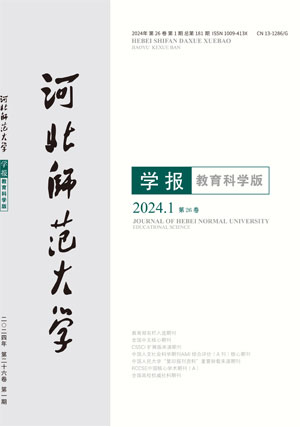期刊信息

- 刊名: 河北师范大学学报(教育科学版)Journal of Hebei Normal University (Educational Science Edition)
- 主办: 河北师范大学
- ISSN: 1009-413X
- CN: 13-1286/G
- 教育部名栏入选期刊
- 全国中文核心期刊
- CSSCI扩展版来源期刊
- AMI综合评价(A刊)核心期刊
- RCCSE中国核心学术期刊
- 全国高校特色栏目社科学报
- 中国人民大学“复印报刊资料”重要转载来源期刊
- 全国高校权威社科期刊
人工智能时代职业教育知识变革三论
-
作者单位:(湖南科技大学 教育学院,湖南 湘潭 411201) -
起止页码:105 - 111页 -
DOI:10.13763/j.cnki.jhebnu.ese.2023.04.014
Knowledge Transformation in Vocational Education in the Era of AI: Ontology,Epistemology and Axiology
摘要/Abstract
生产技术的变革对职业教育教学内容产生最接的影响;技术变革带来的劳动性质的变化、生产组织方式的改变对职业教育人才培养规格具有质的规定性。从标准化生产的“泰勒制”到人工智能时代的自适应生产模式,职业教育知识本体论变革表现在:技术斡件知识成为职业教育知识的重要基础;工作 过程知识成为职业教育知识的核心要素;技术目的知识成为职业教育知识的方向引领。认识论方面主要是知识增长的转型:在产生路径上,自下而上的技能形成将走向自上而下的技性科学应用;在传播方式上,班级授课制将走向实践共同体;在组织环境上,学校本位将走向工作场所为中心。价值论方面的理 性取向包括:从“人机关系”走向“人际关系”;从“技术幻觉”走向“技术自觉”;从“器具工匠”走向“智慧工匠”。
The changes in production technology have the most direct influence on the teaching contents of vocational education. The changes in labor nature and production organization mode brought about by technological revolution have prescribed the qualitative specifications on the talents cultivated in vocational education. From the Taylorism of standardized production to the self-adaptive production mode in the era of AI, the ontological transformation of vocational education knowledge (vek) is reflected in the following aspects: technical orgware knowledge becomes the important foundation of vek; work process knowledge becomes the core element of vek; and technical purpose knowledge becomes the direction of vek. Epistemologically, it is mainly the transformation of knowledge growth: in the generation path, the bottom-up formation of skills will move to the top-down application of technoscience; in the way of distribution, class teaching system will move towards practice community; in the organizational environment, school-based teaching will move to workplace learning. The rational orientations of axiology will transform from “man-machine relationship” to “interpersonal relationship”; from “illusion of technology” to “consciousness of technology”; from “appliance craftsman” to “intelligent craftsman.”
关键词
参考文献 33
- [ 1 ] [美]戴维·明德尔著.智能机器的未来[M].胡小锐,译.北京:中信出版社,2017.
- [ 2 ] 陈宇.中国就业和教育:2030[J].中国就业,2016(5):4-7.
- [ 3 ] 徐国庆.智能化时代职业教育人才培养模式的根本转型[J].教育研究,2016(3):72-78.
- [ 4 ] [以]尤瓦尔·赫拉利著.今日简史[M].林俊宏,译.北京:中信出版社,2018.
- [ 5 ] [美]埃里克·布莱恩约弗森,[美]安德鲁·麦卡菲著.第二次机器革命[M].蒋永军,译.北京:中信出版社,2014.
- [ 6 ] 姜志坚,等.人工智能背景下职业教育发展的策略[J].中国职业技术教育,2017(30):54-59.
- [ 7 ] 唐林伟,黄思蕾.从“机器换人”到“人机共舞”——工业4.0进程中工程技术人才角色定位与教育形塑[J].高等工程教育研究,2020(4):75-82.
- [ 8 ] [英]麦克·扬,[南非]约翰·穆勒著.课程与知识的专门化:教育社会学研究[M].许甜,译.上海:华东师范大学出版社,2021.
- [ 9 ] UNESCO.Rethinking Education: Towards a Global Common Good?[R].2015.
- [ 10 ] 石中英.知识转型与教育改革[M].北京:教育科学出版社,2001.
- [ 11 ] 高伟.知识论批判:一种教育哲学的反思[J].自然辩证法研究,2012(4):95-99.
- [ 12 ] 昌家立.关于建构马克思主义知识论的思考[J].哲学动态,1995(4):24-26.
- [ 13 ] Edwin T., Layton Jr. Through the Looking Glass or News from Lake Mirror Image[J]. Society for the History of Technology,1987,28(3):594-607.
- [ 14 ] Bidney D. Theoretical Anthropology[M]. Piscataway: Transaction Publishers,1995.
- [ 15 ] 殷瑞钰,李伯聪,汪应洛,等.工程方法论[M].北京:高等教育出版社,2017.
- [ 16 ] Scheib T. Work Process Knowledge: A Keyword of Modern Competence Development Focused on the Chemical Industry[A]. Zülch G.,et al. Integrating Human Aspects in Production Management[C]. Boston:Springer,2005.
- [ 17 ] [德]菲利克斯·劳耐尔,[澳]鲁伯特·麦克林著.国际职业教育科学研究手册(下册)[M].赵志群,等译.北京:北京师范大学出版社,2017.
- [ 18 ] [德]乌尔里希·贝克著.风险社会[M].何博闻,译.南京:译林出版社,2004.
- [ 19 ] [英]安东尼·吉登斯著.现代性的后果[M].田禾,译.南京:译林出版社,2000.
- [ 20 ] Robison W. L. Ethics within Engineering: An Introduction[M]. London: Bloomsbury Publishing, 2016.
- [ 21 ] 成素梅.科学技术哲学国际理论前沿[M].上海:上海社会科学院出版社,2017.
- [ 22 ] 李涛.从感觉、经验到技艺、科学与智慧——海德格尔对亚里士多德知识论的阐释[J].哲学研究,2020(6):86-94.
- [ 23 ] [德]马丁·海德格尔著.柏拉图的《智者》[M].熊林,译.北京:商务印书馆,2015.
- [ 24 ] The Boston Consulting Group. Man and Machine in Industry 4.0: How Will Technology Transform the Industrial Workforce Through 2025?[R].2015.
- [ 25 ] [美]保罗·多尔蒂,[美]詹姆斯·威尔逊著.机器与人:埃森哲论新人工智能[M].赵亚男,译.北京:中信出版社,2018.
- [ 26 ] 成素梅,张帆,等.人工智能的哲学问题[M].上海:上海人民出版社,2020.
- [ 27 ] [英]安东尼·塞尔登,[英]奥拉迪梅吉·阿比多耶著.第四次教育革命:人工智能如何改变教育[M].吕晓志,译.北京:机械工业出版社,2019.
- [ 28 ] The Boston Consulting Group. Five Lessons from the Frontlines of Industry 4.0[R]. 2017.
- [ 29 ] Wolf A. Review of Vocational Education: The Wolf Report[R].2011.
- [ 30 ] Pfeiffer S., Suphan A. The Labouring Capacity Index: Living Labouring Capacity and Experience as Resources on the Road to Industry 4.0[R]. 2015.
- [ 31 ] 吴国盛.技术哲学讲演录[M].北京:中国人民大学出版社,2009.
- [ 32 ] [加]安德鲁·芬伯格著.技术体系:理性的社会生活[M].上海社会科学院科学技术哲学创新团队,译.上海:上海社会科学院出版社,2018.
- [ 33 ] [美]克里斯托弗·D·威肯斯,等著.工程心理学与人的作业[M].张侃,孙向红,等译.北京:机械工业出版社,2019.
